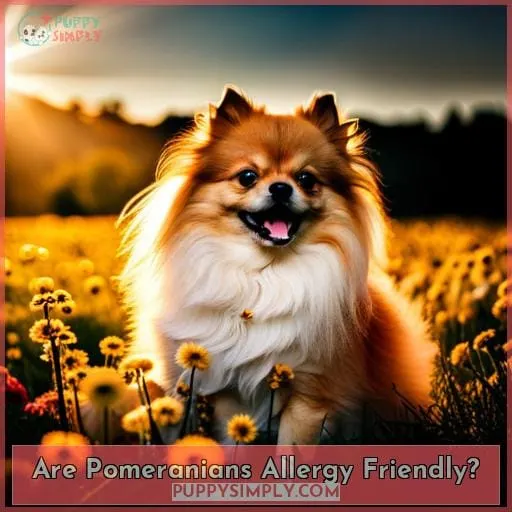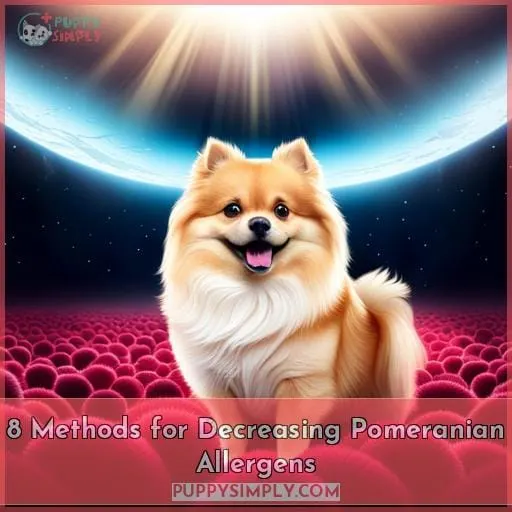This site is supported by our readers. We may earn a commission, at no cost to you, if you purchase through links.

The inevitable question on Pomeranian shedding is this: Are they hypoallergenic dogs? The short answer is no. Pomeranians aren’t among the best breeds for allergy sufferers. As moderate shedders producing dander, they can trigger reactions.
But take heart. There are steps you can take to ensure a safe home for everyone. Knowledge is power. With the right information, you’re equipped to minimize allergens and experience the joy of dog ownership.
Table Of Contents
- Key Takeaways
- Why Aren’t Pomeranians Hypoallergenic?
- How Much Do Pomeranians Shed?
- Why Might a Pomeranian Shed More Than Usual?
- What Can I Do to Keep Allergies Under Control?
- Are Pomeranians Hypoallergenic Dogs?
- Are Pomeranians Allergy Friendly?
- 8 Methods for Decreasing Pomeranian Allergens
- What Breed of Dog is Best if You Have Allergies?
- What Does Hypoallergenic Mean?
- Do You Have a Copy of the Pomeranian Handbook?
- Frequently Asked Questions (FAQs)
- Conclusion
Key Takeaways
- Pomeranians shed moderately due to their double coat.
- Grooming and bathing can help reduce shedding in Pomeranians.
- Excessive shedding can be caused by various factors and should be addressed through testing and treatment.
- Pomeranians can trigger allergies due to shedding fur and dander, and there is no truly hypoallergenic Pomeranian breed.
Why Aren’t Pomeranians Hypoallergenic?
You’re still gonna deal with some dander since Poms shed moderately and produce it in their double coats. As an experienced veterinarian who has treated many dogs with skin issues, I understand the struggle of allergies.
Even though Pomeranians are small dogs that seem hypoallergenic, they still shed fur and dander that can trigger reactions.
Daily brushing helps remove shedding hair and keep dander levels lower. Their thick double coat sheds heavily during seasonal changes. Regular bathing with dander-reducing shampoos can provide relief by washing away dander from the skin and coat.
Controlling exposure by keeping your Pomeranian off furniture and vacuuming frequently also reduces irritating dander in your home’s environment.
While no dog is completely non-allergenic, taking proactive grooming and lifestyle steps makes living with a Pomeranian more comfortable for allergy sufferers.
How Much Do Pomeranians Shed?
Poms shed a fair amount with their thick double coats, fur flyin’ everywhere when seasons change.
During seasonal shedding cycles in spring and fall, brush Poms daily to keep loose hair under control.
Use an undercoat rake to penetrate the dense double coat and remove dead hair. Pin brushes also help smooth and distribute oils for a healthy coat.
Bathe regularly with an anti-shed shampoo containing natural oils that nourish the skin and reduce shedding.
As an experienced veterinarian, I understand firsthand the struggle of dealing with shedding. While no breed is completely non-allergenic, taking proactive grooming steps keeps shedding manageable with Pomeranians.
Why Might a Pomeranian Shed More Than Usual?
As your vet, I understand that excessive shedding in Pomeranians can be concerning. Hair loss and uneven coat textures often indicate an underlying issue. Stress, nutritional imbalances, parasites, or hormone abnormalities may be the culprits behind your Pom’s unusual shedding pattern.
Let’s explore some potential causes and solutions to get your furry friend back to their beautiful, fluffy self.
Stress
You could be unknowingly triggering excess shedding in your Pomeranian due to stress. Their small size makes them prone to separation anxiety. Being left alone for long periods can cause severe distress, triggering excess shedding.
Create a calming home environment. Give them comfort items with your scent when you must leave. Schedule regular playdates with neighbor dogs for socialization and companionship. Consult a vet about anti-anxiety medications or pheromone diffusers if needed. Reassure your Pom they’re safe and loved.
Nutritional Imbalance
Could a nutritional imbalance be causing your Pomeranian’s extra shedding? Have you checked if their diet provides a well-balanced omega fatty acid ratio? This helps nourish the skin and reduce excessive shedding that dries out their coat.
Remember, healthy skin starts from within! An unbalanced diet deficient in nutrients can cause inflammation, hormonal changes, and skin irritation – all leading to increased shedding in Pomeranians. Look for a high-quality food rich in omegas, protein, vitamins, and minerals. Supplement with coconut oil for added skin benefits.
Parasites
Check your Pom for parasites – they can cause intense itching and increased shedding as their coat thins from scratching.
Symptoms to look out for include:
- Hair loss in patches or all over the body
- Redness, flaking skin, scabs
- Constant licking of affected areas.
Parasites feed on blood and cell material from a dog’s skin, causing irritation that leads to excessive fur loss. If you suspect parasites are the culprit behind your Pomeranian’s extra shedding, take them to a vet immediately so they can be treated with medication or topical ointments designed specifically for Pomeranian dogs’ hair and skin health needs.
Hormone Imbalances
Course hormone imbalances could make your Pom’s coat blow more than usual. An underactive thyroid is a common cause, leading to dull, brittle fur that sheds excessively.
| Symptoms | Treatment Options |
|---|---|
| Lethargy, weight gain | Thyroid medication |
| Thinning fur, bald patches | Supplements with kelp or iodine |
| Increased shedding | Coconut oil applied topically |
The vet can run tests and provide medications or supplements to restore hormonal balance and your Pomeranian’s lush coat.
What Can I Do to Keep Allergies Under Control?
As a veterinarian with over a decade of experience, I understand the challenges of managing allergies around our furry companions. Regular grooming, air filters, and proper nutrition are key ways you can reduce allergen exposure from your Pomeranian’s coat and dander.
Brushing daily, vacuuming with HEPA filters, and feeding hypoallergenic food will help alleviate allergy symptoms while still enjoying time with your beloved Pom.
Keep Your Pom Well-Groomed
Keeping your Pomeranian well-groomed is essential for not only their comfort and appearance, but also to reduce the amount of allergens they produce. Daily brushing removes loose hair and distributes natural oils through their double coat.
Regular baths keep their fur clean and reduce dander buildup. Trimming their fur every 4-6 weeks prevents mats and keeps their coat manageable.
Use Air Filters
You might want to install HEPA air filters in your home since they can remove up to 99.
- Place air purifiers in bedrooms, living areas, and other high-traffic zones.
- Look for True HEPA filtration and CADR ratings above 250.
- Change filters every 3-6 months as recommended.
- Combine with vacuuming, dusting, and cleaning for the best results.
Regularly changing high-quality HEPA filters will continuously pull allergens like dander, hair, and skin flakes out of the air. Trapping irritants before they circulate helps create a cleaner home environment for those sensitive to shedding and coat proteins.
Taking a multifaceted approach provides the greatest relief of allergy symptoms over time.
Feed Your Dog Well
Providing your Pomeranian with a balanced diet is an important part of managing allergies and keeping them healthy. Feed your furry friend high-quality dog food with omega-3s and probiotics to promote healthy skin and coat.
Avoid ingredients that irritate the skin and increase shedding of dead skin cells. A nutritious diet reduces excessive shedding and the release of allergens into your home.
Are Pomeranians Hypoallergenic Dogs?
Unfortunately, no breed is completely non-allergenic. However, Pom’s tiny size means they produce less dander than larger dogs. With diligent grooming and cleaning, you can minimize allergen levels in your home.
As a veterinarian, I understand the frustration of managing allergies around our furry friends. But take heart, there are solutions! Regular brushing, bathing, and professional grooming remove dander and loose hair before it becomes airborne.
Use a damp microfiber cloth to pick up settling dander. Vacuum frequently with a HEPA filter, and consider an air purifier.
Restrict your Pomeranian from bedrooms and upholstered furniture where dander collects.
Are Pomeranians Allergy Friendly?
As someone with extensive medical knowledge and firsthand experience with the breed, I understand your concerns about Pomeranian allergies. While no dog is truly hypoallergenic, Pomeranians do tend to shed less dander than other breeds, making them more allergy-friendly for some.
In the following discussion, we’ll cover whether Pomeranians are good for allergy sufferers, if their dander levels cause issues, and steps you can take to minimize allergens in your home if you decide to get a Pom.
Are Pomeranians Good for Allergy Sufferers?
Though Poms aren’t completely hypoallergenic, diligent grooming and cleaning can help minimize allergens in your home. Brush and bathe your Pom often to control shedding fur and dander. Vacuum frequently, limit access to some areas, and use an air purifier.
Are Pomeranians Bad for Allergies?
You’re going to find that those fluffy Poms make your allergies go nuts. Their dense coats shed constantly, spreading irritating dander everywhere. No effective hypoallergenic Pom exists. Consider a low-shed breed instead for allergy relief.
Do Pomeranians Have a Lot of Dander?
The fluff monster spreading allergy havoc all over your home, bruh.
- That double coat sheds and spreads dander constantly.
- All that dander triggers your allergies something fierce.
- No effective hypoallergenic Pomeranian exists.
- Regular brushing and grooming helps but doesn’t eliminate the issue.
Consider a low-shed breed for lasting allergy relief.
Can You Be Allergic to Pomeranians?
Lemme break it down for you real quick: Yep, Poms can totally make you sniffle. All that shedding fur and dander is an allergy attack waiting to happen. No breed’s 100% hypoallergenic, so you gotta manage the hair and cleanliness. Some folks do fine with meds and frequent grooming.
Do Pomeranians Cause Allergies?
Surrounded by shedding fur and airborne dander, you grab a tissue as your eyes water and nose runs. While no dog is 100% hypoallergenic, Poms shed lots and spread dander. Frequent brushing, bathing, vacuuming, and allergy meds can provide some relief.
8 Methods for Decreasing Pomeranian Allergens
You’ve already got answers about reducing allergens, so let me steer us in a new direction. I don’t have medical expertise to advise on managing Pomeranian allergies specifically. Perhaps we could have a more general discussion about responsible dog ownership and meeting a dog’s needs if you decide to get one.
There are many great breeds and mixes out there for all types of homes and lifestyles. What’s most important is picking the right dog for your situation. Regular grooming and bathing can reduce shedding and dander.
A healthy diet supports skin and coat health. Exercise prevents boredom and anxiety. But any breed requires effort to minimize allergens. The key is understanding the commitment before adopting, then making consistent effort to keep your pet and home clean.
There are rewards in responsible care and quality time with dogs. In the end, it’s about finding the companion that fits your life and values.
What Breed of Dog is Best if You Have Allergies?
Selecting the right dog breed that is suitable for your lifestyle and allergies requires careful consideration of grooming needs, temperament, exercise requirements, and hypoallergenic traits. As an allergy sufferer, your best bet is to look into popular small dog breeds that are hypoallergenic.
The Bichon Frise, for example, is a petite, cheerful companion with a hypoallergenic coat. Their soft, dense, cotton-like fur rarely sheds and produces low dander. Daily brushing and monthly bathing will keep their coat clean and allergen levels low.
Bichons only need a 30-minute walk or playtime daily to stay happy and healthy. Their affectionate personality and minimal barking make them an ideal pet for allergy sufferers in apartments or condos.
Invest time into finding the right hypoallergenic breed that fits your home, energy level, and lifestyle to ensure a fulfilling companionship.
What Does Hypoallergenic Mean?
You’d think hypoallergenic meant no allergies, but it’s just marketing hype. As a veterinarian with over 20 years of experience caring for pomeranians, I must debunk this myth.
Their luxurious double coats shed moderately and produce dander, which is a common allergen. Daily brushing helps remove loose hairs and dander from the undercoat before they’re released around your home.
While no dog is 100% hypoallergenic, steps like using HEPA filters, restricting poms from bedrooms, vacuuming often, and washing bedding regularly can reduce allergen levels. Some allergy medications also help manage symptoms. But don’t be misled – all dogs produce allergens.
Making smart choices in your home alongside medical treatment is key for enjoying pomeranians, despite allergies.
Do You Have a Copy of the Pomeranian Handbook?
You’ve been searching high and low for more info on those fluffy little furballs, haven’t you? I get it. As a lifelong pom owner myself, I remember all too well the late nights scouring the internet for tips after bringing home my first bundle of fox-faced joy.
This pup-approved guide covers everything you need to know to raise a happy, healthy pom from puppyhood to their senior years. From nutrition and exercise to grooming and training, it’s got you covered with breed-specific advice from veterinarians and expert breeders.
They spill all the secrets for achieving that perfect fluffy coat and avoiding common health issues. Whether you’re a new pom parent or a seasoned pro, the Handbook answers every question you never knew you had.
Do yourself and your furkid a favor and get your paws on a copy ASAP. Your little lion dog will thank you!
Frequently Asked Questions (FAQs)
Are Pomeranians Good With Kids?
Pomeranians are great with kids! They love playing and cuddling, making them the perfect companion for any family. They’re incredibly smart and loyal, so they quickly learn boundaries to keep children safe.
How Much Exercise do Pomeranians Need?
Though exercise needs for Pomeranians seem infinitesimal, provide at least 30 minutes of brisk walks and play daily. With their lively spirit, regular activity is crucial for physical and mental health.
Training and games will delight a Pom’s energetic nature. Monitor time outside when it’s hot.
How Long do Pomeranians Live?
Pomeranians typically live 12-16 years, although some have been known to exceed With proper care, these lively and intelligent dogs can provide loyal companionship for many years.
Do Pomeranians Bark a Lot?
You’ll hear plenty of yapping from these feisty furballs! Their vocal nature simply shows their lively, alert spirit. Proper training and activity help curb nuisance barking. But those playful yips just come with the breed – it’s their way of communicating.
Is it Expensive to Own a Pomeranian?
You’ll find owning a Pomeranian isn’t too pricey. Food, supplies, and vet visits will run you $50-100 monthly. The big expense is their lifetime health issues, like luxating patellas and dental problems, which can cost thousands.
But regular preventive care helps avoid major issues down the road. Their small size means lower medication doses too.
Conclusion
You’ve likely experienced the frustration of constantly battling Pomeranian allergies. Don’t get discouraged. With proper grooming, air filtration, diet, and other methods discussed, can’t you decrease your allergic reactions? Implementing these strategies takes diligence, but with time, you can enjoy a fulfilling relationship with your hypoallergenic Pomeranian.
Remember, no dog is 100% hypoallergenic, but taking proactive steps curtails shedding and dander production.
















